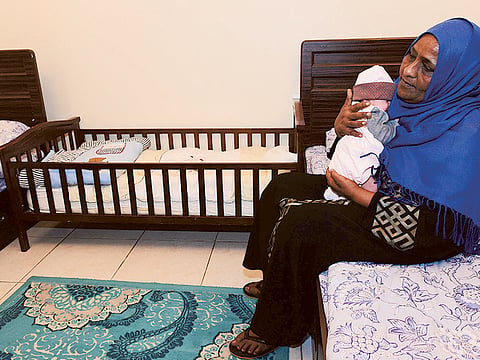Sharjah Children Care Centre doing examplery work
Abandoned children given a new lease of life with adoptive families reintegrated into the mainstream

Sharjah: A villa in Al Qarayan area in Sharjah serves as a haven for all abandoned babies in Sharjah as well as for babies from the northern emirates.
The villa also houses neglected children, abused children and children whose parents have marital problems.
The Children Social Care Centre only receives children from authorised channels like the police, hospitals or helplines.
Established in 2006, the Children Social Care Centre is considered the second house to accommodate children who are deprived of social care in the UAE [the first one is in Abu Dhabi]. Children are housed here on a temporary basis till their family circumstances improve or till they are embraced by a family.
“The issue of abandoned children is found in every society,” said Fatima Al Marzouqi (left), Director of the Centre which gave Gulf News exclusive access to it. “In Islam, orphaned and abandoned children have a special position in society. Caring for an abandoned child is considered a good deed,” said Al Marzouqi.
Al Marzouqi explains that after a case is reported to Sharjah Police, the child undergoes a check-up to ensure it is safe and healthy before being transferred to the home of the family embracing it.
Potential parents, who must be Emirati, are placed on the database after going through an extensive evaluation and assessment process. The family’s background and financial status are evaluated, followed by a medical assessment of the parents by a psychologist. “The complete evaluation report is submitted to a committee which then decides if the family is eligible to embrace the child,” Al Marzouqi explained.
At the time of Gulf News’ visit to the centre, the older children were still out at school, while many infants were sleeping. The house has separate wings for boys and girls. There is also a play area outside with swings and slides.
Around 40 employees work in the child social care centre. Each shift has about 10 staff, including caretaker, nurses and housemaids who work round-the-clock to ensure full support for them, said Al Marzouqi. A paediatrician visits them at least three times a week. An emergency doctor is always on standby.
The children’s daily schedule at the centre is organised according to a time-table. For example, depending on their age, children are woken up between 5.30am and 6am, following which they pray and get ready for school. “They have a daily allowance which varies depending on their age,” said Al Marzouqi.
The children return from school by 1.30pm, have lunch and, after a couple of hours of rest, get ready for their evening play and tuitions.
Academically weak students have tuitions every day, while others have classes three times a week.
The centre attends to religious, educational, cultural and social activities for the children. Children are groomed in basic self-care, and have enjoyable weekend activities which include outings to various outdoor locations in Sharjah and othr emirates. The children are taken to any new attraction that opens in the UAE has for a visit, Al Marzouqi said.
Regarding the adoption or embracing of orphan children by families, “It has never happened that a child has not found a family,” she said. “All of them have someone to take care of them,” she said. “A few cases stayed with us till they reached the age of 18 after which they were integrated directly from the centre into society.”
Till such time as the individual is able to live by himself, children after 18 are supported financially and given accommodation by the centre. “In case the person is in any difficulty, we are there to help. We keep in touch with them till they become self-reliant,” Al Marzouqi said.
Many of the children at the centre, she said, have gone on to “work in high positions in society — doctors, engineers, professors, pilots or police officers.”
Al Marzouqi believes that people who embrace an orphan child should tell the child the truth of his identity when the child reaches the age of six. Telling the child the truth at this age helps it to lead a well-integrated life in society.
As many as eleven children, including boys and girls at the centre, are still waiting to be embraced by a family.



